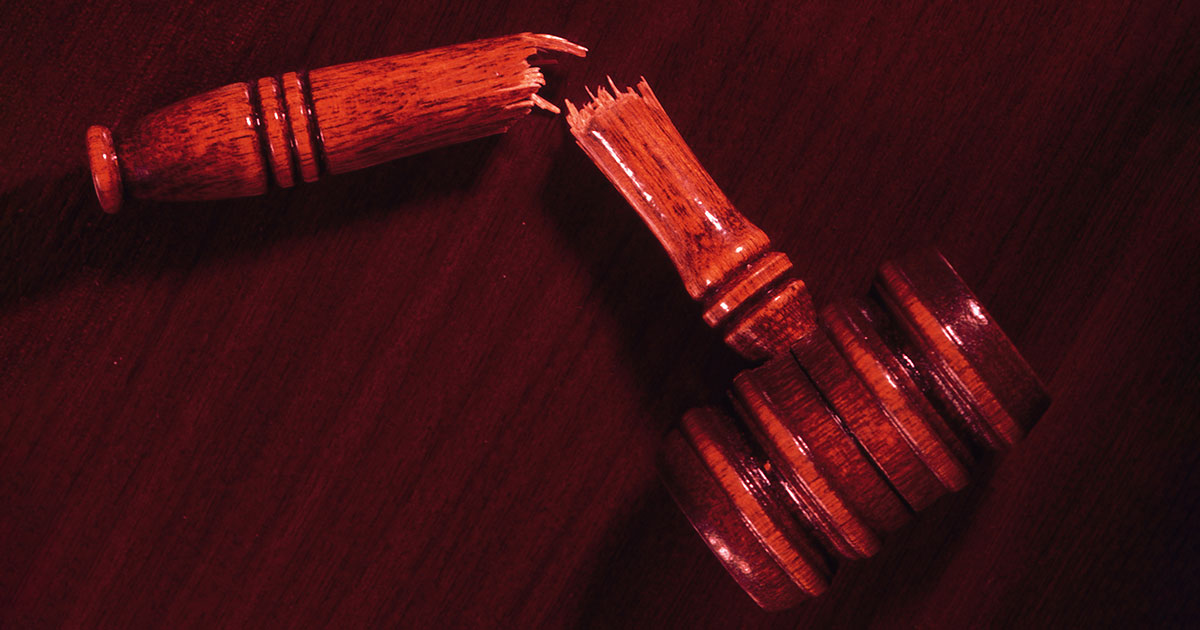
April 3, 2024 – How are Wisconsin judges held accountable for misconduct? How are judges removed from the bench if they suffer from disability that impacts their ability to judge effectively?
The following resources will help you understand the Wisconsin law concerning judicial conduct and the administrative proceedings that may lead to reprimand, censure, suspension, or removal of a judicial officer for cause or disability by the Wisconsin Supreme Court.
The conduct of Wisconsin justices and judges is governed by the Wisconsin State Constitution, Supreme Court Rules, statutes, and regulations.
Wisconsin Constitution
Article VII of the Wisconsin Constitution contains the constitutional provisions governing the judiciary, including jurisdiction of courts, term length of judges, eligibility, and elections and appointments. Article VII, Section 11 governs judicial disciplinary proceedings:
 Wendy Smith is a reference librarian and adjunct associate professor of law at Marquette University Law School in Milwaukee, where she teaches introductory and advanced legal research. She is an active member of the State Bar of Wisconsin as well as a member of the Law Librarians Association of Wisconsin (LLAW).
Wendy Smith is a reference librarian and adjunct associate professor of law at Marquette University Law School in Milwaukee, where she teaches introductory and advanced legal research. She is an active member of the State Bar of Wisconsin as well as a member of the Law Librarians Association of Wisconsin (LLAW).
Each justice or judge shall be subject to reprimand, censure, suspension, removal for cause or for disability, by the supreme court pursuant to procedures established by the legislature by law. No justice or judge removed for cause shall be eligible for reappointment or temporary service. This section is alternative to, and cumulative with, the methods of removal provided in sections 1 and 13 of this article and section 12 of article XIII.
Article VII, Section 1 allows for impeachment by the Senate of “all civil officers of this state for corrupt conduct in office, or for crimes and misdemeanors.” Further, “[n]o judicial officer shall exercise his office, after he shall have been impeached, until his acquittal.”
Article VII, Section 13 permits any justice or judge to be removed from office “by address of both houses of the legislature, if two-thirds of all the members elected to each house concur therein,” provided that the justice or judge is provided notice and an opportunity for a hearing.
Article XIII, Section 12 allows for the recall of any elective officer by petition of qualified electors of the state.
The remainder of this article focuses on the authority of the Wisconsin Judicial Commission to pursue disciplinary action against a judicial officer “for cause or disability” pursuant to Wis. Const. Art. VII, Section 11.
Wisconsin Supreme Court Rules
Wisconsin Supreme Court Rule Chapter 60 is the Code of Judicial Conduct, which sets the binding conduct standards for judicial officers and provides the structure for regulating judicial conduct through disciplinary agencies. These rules are comprehensive and should be reviewed individually. A few examples of conduct standards follow:
SCR 60.02 – Uphold integrity and independence of the judiciary;
SCR 60.03 – Avoid impropriety and appearance of impropriety;
SCR 60.04 – Perform duties impartially and diligently;
SCR 60.05 – Minimize the risk of conflict with judicial obligations;
SCR 60.06 – Refrain from inappropriate political activity.
The Code of Judicial Conduct contains explanatory Comments and annotations to assist the researcher in interpreting these rules.
Wisconsin Judicial Commission
The Wisconsin Judicial Commission (WJC) investigates and prosecutes allegations of misconduct or disability of Wisconsin judges and court commissioners. Examples of conduct that may be subject to disciplinary prosecution include a judge’s failure to perform their duties impartially and diligently, conflicts of interest, abusive or improper treatment of parties, or a judge’s mental or physical inability to perform their judicial duties.
Note that alleged errors in fact-finding or legal conclusions are not subject to disciplinary proceedings – these alleged errors are addressed through judicial appeal.
The WJC has jurisdiction over Wisconsin state and local judicial officers in the judicial branch, but not federal judicial officers, tribal court judges, or state administrative law judges.
How does someone lodge a complaint against a judicial officer? The WJC publishes a Request for Investigation Form to lodge a complaint of alleged misconduct or disability of a judge in writing. Per Wis. Stat. section 757.93 and Wis. Admin. Code JC § 3.01, complaints filed with the WJC and its proceedings are confidential unless the commission elects to file a public complaint in the Wisconsin Supreme Court.
The WJC also answers Frequently Asked Questions about the judicial disciplinary process.
WJC: Governing Statutes & Regulations
Wis. Stat. sections 757.81 through 757.99 govern the WJC. Notable sections include:
Wis. Stat. section 757.81 – Defining “misconduct” and “permanent disability.”
Wis. Stat. section 757.85 – Describing the WJC authority to investigate possible misconduct or permanent disability, including subpoena power and the power to compel a medical examination; upon the WJC finding probable cause of misconduct or permanent disability, the WJC shall file a petition with the Wisconsin Supreme Court for prosecution.
Wis. Stat. section 757.91 requires the Wisconsin Supreme Court to review findings of fact, conclusions of law, and recommendations of the WJC to determine appropriate discipline for cases of misconduct and appropriate action for cases of permanent disability.
Wis. Admin. Code JC Chapters 1-6 include the administrative regulations governing the WJC:
JC Chapter 3 describes the general provisions of the WJC, such as jurisdiction and process.
JC Chapter 4 addresses investigation and proceedings of alleged judicial misconduct.
JC Chapter 5 addresses investigation and proceedings of alleged judicial disability.
Case Law Involving Judicial Discipline
Consult the Digest of Published Judicial Disciplinary Cases for case law examples. Full-text case opinions of the Wisconsin Supreme Court may be available through the Wisconsin Court System (1995 to present). Older decisions may be accessed in print reporters or through electronic databases.
The WJC 2023 Annual Report also summarizes allegations and dispositions relating to judicial conduct received by the commission in the 2022 calendar year.
Treatises, Practice Guides, and Other Secondary Sources
Chapter 2 of Wisconsin Governmental Claims & Immunities, State Bar of Wisconsin PINNACLE®, §§ 2.4-2.8 covers judicial immunity.
Callaghan’s Wisconsin Pleading & Practice, 5th Ed. With Forms, Part I, Chapter 3 Judges and Commissioners, §§ 3:40, 3:40.50 govern judicial discipline, removal, or retirement (Available in print)
Prosecution and Defense of Disciplinary Charges Against Judges, 151 Am. Jur. Proof of Facts 3d 1 (Originally published in 2015) (Available in print or Westlaw/Lexis)
Disciplinary Action Against Judge on Ground of Abusive or Intemperate Language or Conduct, 89 A.L.R. 4th 278 (Originally published in 1991) (Available in print or Westlaw/Lexis)
Willful Misconduct Relating to Official Duty, 48A C.J.S. Judges § 116 (Updated March 2024) (Available in print or Westlaw)
Where to Get Additional Information
The resources below provide additional information on judicial misconduct.
Don’t forget that a librarian can efficiently direct you to trusted legal practice materials. Reach out and ask your local law librarian for help with your research, or at these libraries:
